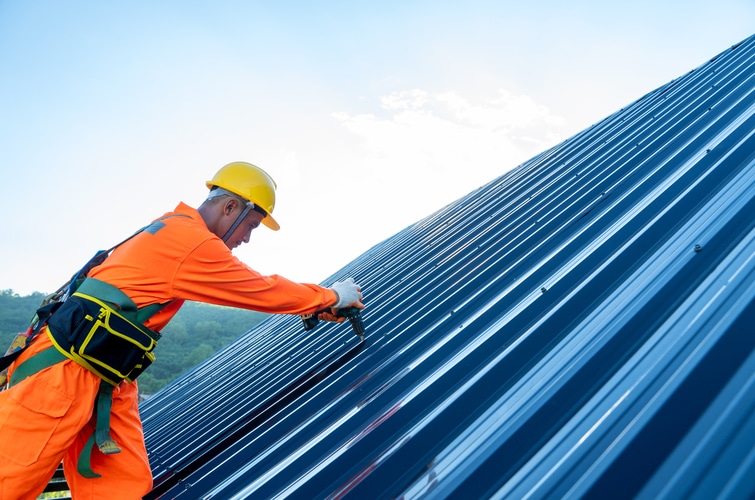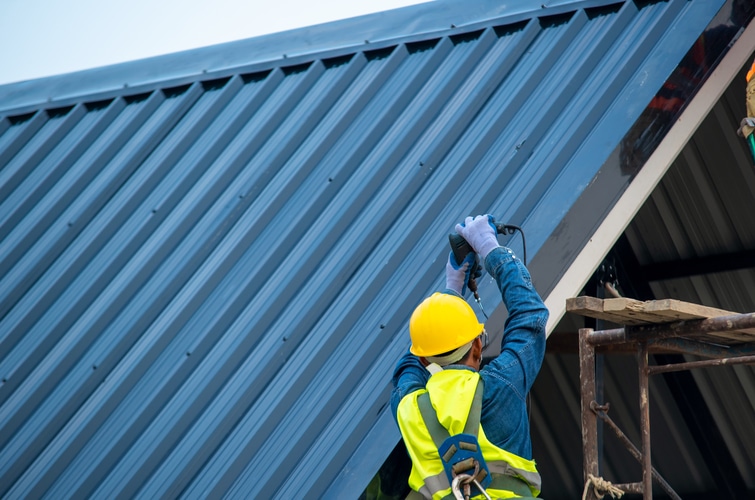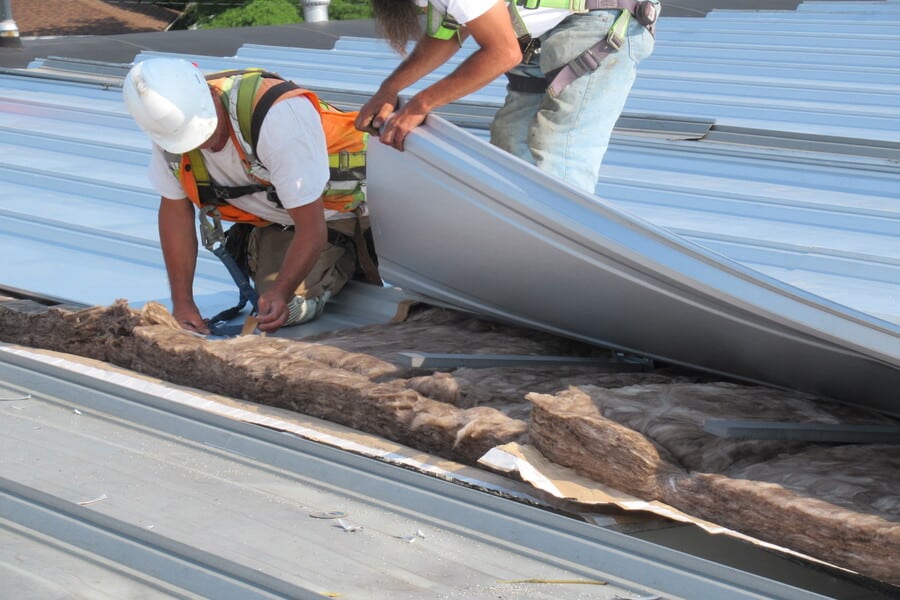2800 14th Ave, Unit 13
Markham, ON L3R 0E4

Harsh winter weather conditions in Canada take their toll on commercial roofing. High winds, cold temperatures, heavy snow, and moisture can all impact your commercial roof. Added to that, commercial roofs also then need to survive summer conditions, with heat, hail, and other extreme weather. As spring approaches, don't get caught unprepared, and make sure you have your roof inspected and maintained proactively.
Rather than waiting until you get water damage or structural damage, a bit of preventative care and maintenance can save you money on costly repairs, as well as prevent the hassle of dealing with emergency issues.
Having a professional examination to identify any potential issues ahead of time, and getting maintenance and any minor roof repair completed before those minor concerns become big issues is far more cost-effective.

For the spring season, some regular maintenance and inspection tasks should be performed to extend the life of your commercial roof.
It is important to start your spring commercial roof maintenance by cleaning the roof so it can be inspected and to remove unnecessary debris that can lead to issues like water pooling, trapped moisture, mould and mildew that can deteriorate your roof membrane and other materials. Dirt and leaves build up through the winter, but maintenance can get your flat roof clean and clear again.
Be sure to also clean your gutter systems. Cleared gutters and drains allow water to drain away properly. Leaves, dirt, and other debris should be removed from gutters, downspouts, and drains to enable adequate drainage.
Remove any branches from nearby trees that could damage your roof, or address any other external potential sources of damage to your rooftop surface.

A key step in spring care of your commercial property is to schedule a roof inspection, to make sure you don't have a damaged roof, and that the roof system is still working as it should. This should be scheduled to be completed as soon as the roof has been cleaned and the branches removed. Any hazards or areas of weakness and deterioration will be identified, so necessary roof repairs can be categorized.
This inspection will identify any winter damage and prioritize maintenance and repairs to make your planning easier. Damaged flashing, ceiling stains, soft spots, mould, damage to roof membranes and materials, and loose fasteners and sealants will be identified.
You will get a review of your building roof systems and the dates that items are expected to need replacing, to enable informed decisions and a capital expenditure plan for maintenance or roof replacement.
If any leaks were identified, the roofing consultant will identify the root cause of the leak. Be sure to get these repaired as soon as possible to prevent moisture damage. All seams and flashings need to be checked and sealed to prevent future leaks. Drying out damp areas and remediation of materials damaged by moisture or mould will also need to be completed.
A moisture survey uses infrared scans primarily on conventional roofs to check under the building roof membrane. Moisture surveys identify the presence of water, the amount of heat retention by insulation, and other concerns.
Roof insulation testing helps you prepare for changes in temperature, keeping inside temperatures regulated and preventing excessive moisture. Professional inspections confirm whether your insulation is in good condition, as well as whether the ventilation system is working properly.
Damaged or worn insulation and other ventilation system issues need to be replaced or repaired immediately.
Damaged materials should be repaired or replaced as necessary for your commercial roof.

Proactive spring maintenance helps prevent premature replacement and repairs, but sometimes, you may have signs of existing damage. It is important to act on these signs and get a professional roofing contractor to conduct an inspection to determine the cause and extent of the damage.
If you notice any leaks throughout the winter or spring, be sure to contact a professional roofing consultant to inspect your commercial roof and conduct repairs as recommended. Watch for water damage on walls and ceilings. You are more likely to notice water coming through after heavy snowfalls or spring sleet. Loose roofing panels, punctures in roofing surfaces, and degraded materials could be causes of your leaking. A commercial building with a flat roof where the snow was allowed to build up throughout the winter will be more prone to this.
Heavy snow can cause a sagging roof, which you can spot; the weight of heavy snowfall can affect the structural integrity of your roof and may cause it to collapse.
If you spot mould and algae along ceilings and walls, this may be an indicator of a leak or other roofing or building envelope concerns.
Property managers may also notice a drop in energy efficiency and difficulties in heating your building, which may be a result of damaged commercial roofing.
After storms and extreme weather events, an inspection is a good idea, regardless of the season.

1. Why is spring maintenance crucial for commercial roofs in Canada? Spring maintenance prepares commercial roofs for transitioning from harsh winter conditions to summer extremes. Proactive care prevents costly repairs and emergencies.
2. What should be included in spring maintenance tasks? Tasks include roof cleaning, clearing gutter systems, removing overhanging branches, conducting a professional roof inspection, addressing leaks, performing moisture surveys, testing insulation, and replacing worn materials.
3. How can I detect signs of roof damage? Watch for leaks, water damage, energy efficiency drops, and structural issues. These indicators prompt professional inspection and necessary repairs.
4. Why is roof cleaning important? Cleaning removes debris that can lead to issues like water pooling, trapped moisture, and mold growth. It also enables a proper inspection of the roof's condition.
5. When should I conduct a roof inspection? Schedule a roof inspection in the spring after cleaning and branch removal. Additionally, inspections after storms or extreme weather events are recommended.
6. How can I prevent leaks and moisture damage? Address leaks promptly and seal seams and flashings. Conduct moisture surveys to identify and address water intrusion issues.
7. Why is insulation testing important? Insulation testing ensures temperature regulation and ventilation. Replacing damaged or worn insulation prevents energy inefficiency and potential moisture problems.
8. Can heavy snow affect the roof's structural integrity? Yes, heavy snowfall can cause a sagging roof and affect its structural integrity. Roof collapse is a possibility under excessive snow loads.
Get your commercial roof ready for spring and summer, and know what spring maintenance you should be planning for, with ABSI's roofing consulting.

Naji Hassan, a renowned professional in Building Science and Engineering, brings a wealth of knowledge and experience to his field. Educated at Beirut Arab University and Harvard Business School Online, Hassan has honed his expertise in structural and municipal engineering, building science, and business management. As the President of Accent Building Sciences and an experienced Senior Project Manager, he has made significant strides in building envelope engineering, building condition assessments, and energy retrofit programs. His commitment to innovation and excellence is evident in his approach to large-scale project management and his active participation in industry organizations. Hassan is not only a leader in his field but also a prolific writer and thought leader. He regularly shares his insights and experiences through articles on LinkedIn, which can be found at LinkedIn Articles. Additionally, he maintains a blog where he delves deeper into various aspects of building science, accessible at Accent Building Sciences Blog. Outside of his professional pursuits, Hassan enjoys travel, golf, languages, gardening, and music, reflecting his diverse interests and well-rounded character. Naji Hassan's journey in building science and engineering is not just a career but a testament to his lifelong dedication to learning, teaching, and inspiring others in his field.
